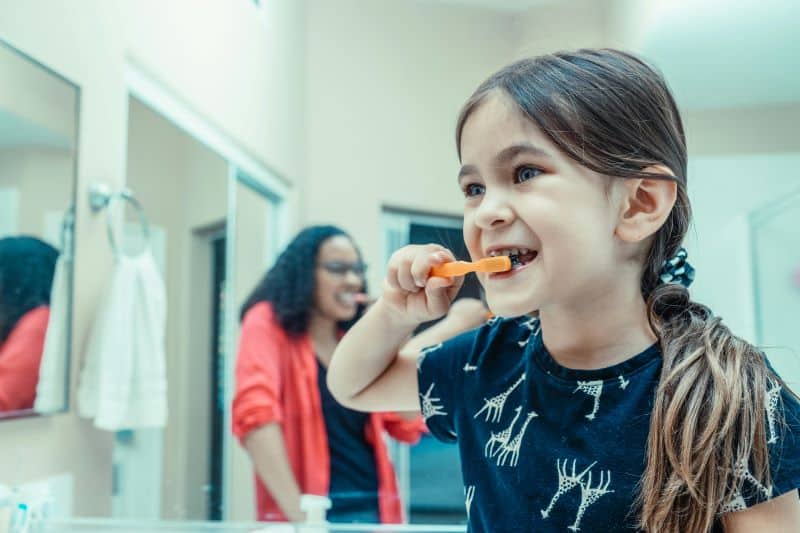
17 Aug 10 Ways To Help Your Child Remember to Brush Their Teeth
10 Ways To Help Your Child Remember to Brush Their Teeth
Ensuring your child maintains good oral hygiene is crucial for their overall health. Brushing their teeth regularly is a fundamental habit that, when instilled early, can prevent numerous dental problems. However, getting children to remember and enjoy brushing can be a challenge for many parents. In this article, we’ll explore ten effective strategies to help your child build a consistent brushing routine that lasts a lifetime.

1. Establishing a Routine
Establishing a consistent routine is the cornerstone of fostering good oral hygiene in children. Regularity helps children understand that brushing is not optional but a necessary part of their daily activities. To set a brushing routine, aim to incorporate brushing at the same times each day, such as after breakfast and before bedtime. Associating brushing with these daily events helps create a sense of predictability, making it easier for children to remember.
2. Making Brushing Fun
Children learn best when they’re having fun. Turning brushing into a game can make the process enjoyable. Consider using timers, making up songs, or creating challenges where they “defeat” the plaque monsters on their teeth. There are several apps and toothbrushes designed to make brushing fun for kids. These tools often include interactive games, rewards, and music that keep children engaged and motivated to brush.
3. Leading by Example
Children often mimic their parents’ behaviors. By demonstrating good oral hygiene habits yourself, you encourage your child to do the same. Your commitment to brushing can inspire them to follow suit. Brushing together as a family can reinforce the habit. This shared activity not only sets a good example but also makes brushing a bonding time. Consider making it a fun family ritual, where everyone brushes at the same time each day.
4. Visual Aids and Reminders
Visual aids like charts and checklists can be powerful tools in reminding children to brush their teeth. A reward chart where they can place a sticker each time they brush can be particularly motivating. Placing visual reminders in the bathroom, such as colorful posters or reminders on the mirror, can help keep brushing top of mind for your child.

5. Reward Systems
Positive reinforcement is a great way to encourage good brushing habits. Praise your child when they remember to brush, and consider offering small rewards for consistent brushing. When selecting rewards, consider options that promote healthy behaviors, such as a new book, an extra bedtime story, or a small toy. The key is to make the reward something your child values without turning it into a bribe.
6. Educational Tools
Educational materials like books and videos can help children understand the importance of brushing their teeth. Choose resources that explain oral hygiene in a way that is both engaging and understandable for your child. When talking to your child about brushing, use language and concepts they can relate to. For example, you might explain that brushing helps keep their teeth strong and healthy, so they can enjoy their favorite foods without pain.
7. Involving Your Child
Involving your child in selecting their toothbrush and toothpaste can make them more excited about brushing. Let them choose a toothbrush with their favorite character and a toothpaste flavor they like. Allow your child to make small decisions about their oral care routine, such as whether to brush before or after a bath. This sense of autonomy can make them more willing to participate.
8. Visiting the Dentist
Regular dental visits are essential for maintaining oral health and can reinforce the importance of brushing. A dentist can provide additional motivation by explaining to your child the benefits of good brushing habits. If you’re child isn’t feeling very motivated to brush their teeth, offering a reward for no cavities at their regular dental cleaning can be a great way to get them engaged and excited to visit the dentist. Ensure that dentist visits are positive experiences by choosing a pediatric dentist who creates a welcoming and friendly environment. This can help alleviate any anxiety your child may have about going to the dentist.
9. Creating a Kid-Friendly Brushing Area
Creating a pleasant, kid-friendly environment for brushing can make the experience more enjoyable. Consider adding bright colors, fun decorations, and a step stool so they can easily reach the sink. Make sure the brushing setup is comfortable for your child. The toothbrush should be easy to grip, and the toothpaste should be within reach. A comfortable environment can make brushing less of a chore and more of a routine.
10. Dealing with Resistance
It’s normal for children to resist brushing at times. Understanding the reasons behind their reluctance—whether it’s discomfort, boredom, or distraction—can help you address the issue more effectively. To overcome resistance, try to keep brushing time short and sweet, use positive reinforcement, and ensure that brushing isn’t a battle. Patience and persistence are key.

In Conclusion
Good oral hygiene habits begin early and last a lifetime. By implementing these strategies, you can help your child develop a positive attitude toward brushing and flossing their teeth, ensuring they maintain a healthy smile. Encourage your child to take ownership of their oral health, and remember that consistency is key.

Sorry, the comment form is closed at this time.